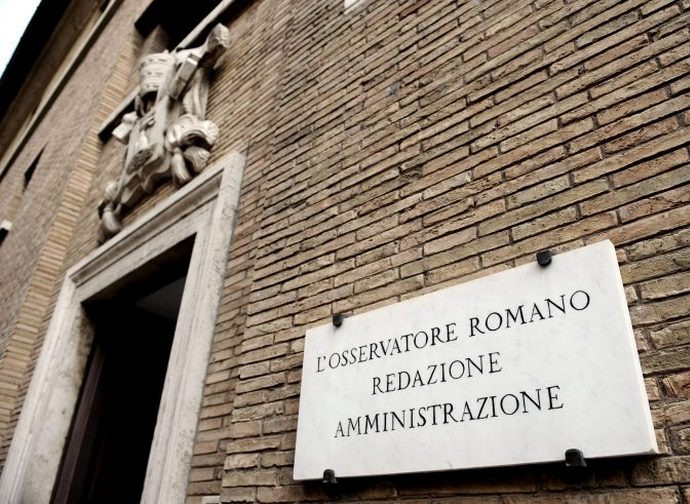Now also L’Osservatore Romano embraces the gay and secularised Church
In a lengthy interview with the Vatican newspaper, Cardinal Hollerich, president of the European bishops, theorises a “Church-that-does-not-discriminate”, in which there is no longer even any need to convert: having erased sin, original and present, everything that exists is good. And of course it is good to bless homosexual unions. Just to be clear: the interview with Hollerich, as well as that previous with Zuppi, is not a personal opinion, but is intended to indicate the path established at the top.

Cardinal Jean-Claud Hollerich, Archbishop of Luxembourg, expressed his ideas on the Church today and in the future in a long interview with L'Osservatore Romano that Vatican News entitled "The Church must change, we risk speaking to a man who is no longer there". Hollerich is a very important cardinal today. He chairs COMECE, the episcopal body of the European Union countries; he is vice-president of the Council of European Bishops, and he is the General Rapporteur to the Synod on Synodality. In effect, he a key man in the Church of Pope Francis.
From this interview with him, and from the one the Vatican newspaper published a month ago with Cardinal Zuppi, which we have commented on here, emerges the ecclesial and pastoral "what to do?" of our time. Mega-interviews of this kind in L'Osservatore respond to a political function, they serve to make the interviewee say how important he or she believes it is to confirm a line or to oppose it. This does not mean that they are less important, they are in fact more so, because they do not express personal opinions but the path that has been established at the top.
Regarding this path, first of all let us set our hearts at rest on one particular point: there will be blessings of homosexual couples in church, they will be allowed and even regulated. What the Flemish bishops have done will become the norm for everyone (which is why it is easy to think that the initiative did not come from them). Hollerich says this as a 'pastor': “A few weeks ago I met a girl in her twenties who told me ‘I want to leave the Church because it does not accept homosexual couples’; I asked her ‘Do you feel discriminated against because you are homosexual?’ and she replied, ‘No, no! I am not a lesbian, but my closest friend is. I know her suffering, and I do not intend to be part of those who judge her'. This - the cardinal concludes - has made me think a lot”.
He then goes on to say that homosexual persons have not chosen their sexual orientation, that they are not 'bad apples', that when God saw creation He said it was good, therefore: “I do not think there is room for a sacramental marriage between persons of the same sex, because same-sex unions lack the procreative character of marriage, but this does not mean that their affective relationship has no value”. To bless a same-sex couple is a good thing, because God does not curse anyone.
A Church-that-doesn't-discriminate is Cardinal Hollerich's proposal for the Church's mission in today's world. A Church that proclaims the Gospel in a radical way: "We are called to proclaim good news, not a set of rules and prohibitions". A Church that wants to proclaim the Gospel “primarily through its commitment in the world to the protection of creation, to justice, to peace”. In today's world, he says, it is not what we say but what we witness that is received. According to him, the encyclical Laudato sì' is understood and appreciated even by non-believers because it is the proclamation of a 'new humanism', which is not a political proposal but is Gospel.
Hollerich's is the proposal of the Church today: “Start from reality, that reality that sees us all as creatures and children of the same Father”. Reality, however, is not what it should be, and starting from reality can also mean starting from something corrupt and deviant. If by reality we mean the existent, starting from the existent is insufficient, brotherhood is founded on the truth and not merely in being, a discriminating look, an evaluative light is needed beforehand. Therefore, the starting point is not from the existent, but from the eternal, which then gives light to the existent because it stops us falling into its traps.
Hollerich's Church has now completely metabolised secularisation, which is seen as positive and irreversible. This means accepting mere existence as normal, denying the possibility of a fallen situation. The blessing of homosexual couples means the blessing of the existent simply because they exist. As if sin, both original and the present, no longer exists. It also entails two important novelties in today's Church: the first is that one can and must collaborate with everyone; the second is that one must bend absolute moral principles so as not to be divisive. Not collaborating with everyone and being divisive would in fact mean being discriminating, and today's Church thinks it can no longer be so.
The existent shows the 'anthropological changes' on which Hollerich insists with great concern, emphasising that they are no longer only cultural but now are physical and genetic. But with the criterion of non-discrimination of the existent, how is it possible - one wonders - to counter such a revolutionary, imposing, and very rapidly changing existent? How can we not see in the anthropological changes of the new Adam, the extreme outcomes of that secularisation that the Church of today accepts and welcomes as positive, so as not to discriminate against secularised mankind? That is, the mankind which no longer exists?


